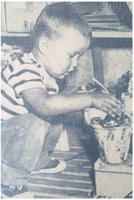We woke up this morning to a beautiful blue sky. Gracie woke me at 6:30 to make sure I got to see as much of the day as possible. Ginger and I ate breakfast together and then she left for work. I came upstairs to check email and could feel the gathering gloom. Sunshine or not, I was in for a dark day. If I didn’t keep moving, I knew I was going to end up on the couch doing nothing. I worked hard not to give in. I got dressed quickly, as if some sort of emergency was forcing me to evacuate the premises. I had a plan: I would run errands. The pups, however, had a plan of their own: they made it clear that a trip to the beach was in order before I did anything else. It was fun to watch them run. They were right; I needed to walk with them.
My first errand was to drive to Marshfield Town Hall and get a dump sticker – excuse me, a transfer station sticker. The town dump is a part of small town New England life. Though Marshfield does have curbside pick up, there are certain things you can’t leave on the curb. Our TV went out (several months ago) and I have been carrying it in the back of my Cherokee since before Christmas, I think. I decided getting the sticker and dumping the TV would be one thing (is that two things?) that would give me a sense of accomplishment. It did. I also learned I can go back to the dump and get all the free compost I want for my garden. The trip was both fun and educational.
My second errand was to the pharmacy and get my prescriptions refilled for our trip. Our HMO has a pharmacy in Braintree, about fifteen miles away, and the drugs are less expensive than our local CVS, so I drove there – it’s also next door to a Borders Books, which is where I went while they were filling the prescriptions. I was in search of a book I saw at the Flower Show on “Square Foot Gardening,” which looked interesting because Mel Bartholomew, the author, was talking about how to make the best of small spaces. My vegetable garden is small and I want to do more with it this year. I found the book, got a cup of coffee, and spent an hour reading and dreaming of tomatoes, zucchini, basil, and lemongrass.
I went back to the pharmacy, got my medicine, and headed for Whole Foods in Hingham to pickup the Newman’s Own peanut butter cups (fair trade, of course) for a Certain Someone who is coming off of her Lenten chocolate fast on Sunday. I was doing pretty well. As I walked to the car in the sunshine, I had visions of coming home and working in the garden a bit before staff meeting tonight, but I ran out of gas. The energy drained from me like air out of a runaway balloon. All I wanted to do was go home and sleep. I kept it at bay for the morning, but my depression was out to claim the afternoon. I then remembered the Red Sox home opener was on TV at two; I had a reason to go home to the couch other than giving into the darkness. I would not be alone; I would be a part of Red Sox Nation.
About that time, Ginger called to ask where I was and to say she had just gotten home. I really wouldn’t be alone. When I got home, we both took a little nap and then she suggested we go for a walk (the game was over: Red Sox won). Walking with her is one of my favorite things, not because I like walking that much, though. I like walking with her. I do know walking helps increase the serotonin levels in my system, thus helping me deal with my depression, but even that is not necessarily enough to get my feet on the street. But for Ginger, I’ll walk. She was right. I needed to walk with her.
We got back to the house just in time to head out to our separate meetings at our separate churches. On the way to Hanover, I heard a story on NPR about Donald Knaack, who is known as “The Junkman.” He is a classically trained percussionist who studied with John Cage and makes music from found items: saw blades, beer cans, pieces of wood, even a snowboard xylophone. He left positions in the Louisville Orchestra and the Buffalo Philharmonic to “pursue a career in junk.” He lives in Vermont. The story focused on his “junk opera,” Odin, opening in New York this weekend. Knaack said he chose Odin because he was simultaneously the Norse god of war and the god of knowledge. Odin was credited with developing the alphabet and poetry and knew only knowledge could overcome the violence of war.
“Marcel Duchamp said, ‘Tools that are no good require more skill.’ And that’s knid of become my mantra: the idea of taking tools that are no good, in other words, taking junk – things that people have discarded and said, “that’s no longer of value to me.’ I find a whole new value for these materials in terms of making music and hopefully it’s something people want to hear,” Knaack said.
I don’t know much about Norse gods, but the myth rings true. The insidious violence of depression and the informed hope that grows out of the poetry and melody of grace are both inside of me. Most of my days are “both/and” rather than “either/or.” Whatever poetry comes grows out of the fledgling vocabulary I have developed to talk about what is happening inside of me. Whatever melody I play is banged out on the materials scattered across my life. I, too, am a junkman.
Today was not a great day. I’m having a hard time. And I did manage to make a little music. That will have to be enough.









